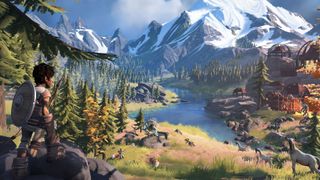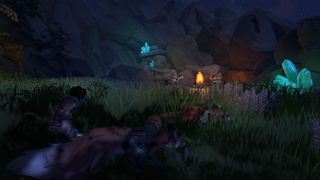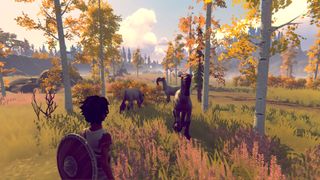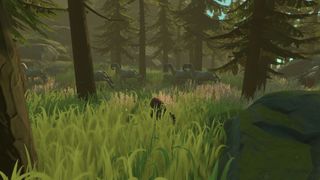AI animals have 'lives, goals and quests of their own' in this ambitious sandbox action game
A young boy searches for a new home on a mysterious island where humans aren’t the only civilized animals.

One of the most memorable moments in The Legend of Zelda: Breath of the Wild takes place on Eventide Island. You find yourself stranded on a small island, alone, without any of your hard-earned tools, surrounded by unfriendly monsters. You feel powerless. You wish you could do other than run or try to scavenge what you need to survive. What if I could just talk to those Moblins, you might ask yourself, and somehow get them to stop hating me so I didn’t have to fight them anymore.
Pine, a singleplayer adventure game from Netherlands-based indie Twirlbound, tries to answer that question. In the recent Kickstarter success, you play as Hue, a young boy tasked with finding a new home in a world where humans are outclassed by evolved civilizations of moose, alligators, foxes, and other animals. Using a combination of crafting, exploration, combat, and diplomacy, it’s your job to find a safe haven for Hue’s small human tribe.

In finding that new home, Hue is faced with a choice. You venture out onto Albamare, the mysterious island that comprises Pine’s world, with nothing but a shield and a sword. You can try your hand at combat, fighting species like the Fexel and Litter for resources and supremacy, or you can choose to talk with these civilizations, trading with them and accomplishing tasks with them in order to earn their trust and forge community. Your actions will earn you resources that you can craft and trade with, and in my experience, certain actions even triggered changes in my relationship with the island’s different tribes.
Matthijs van de Laar, creative director at Twirlbound, emphasizes that the second path is absolutely the game’s focus. “We designed a system of food and a system of diplomacy,” van de Laar says. Earning the trust of the game’s tribes isn’t easy. At the opening of the game’s pre-alpha build, which Van de Laar says should be going out to Kickstarter backers soon, I found my way to a village populated by the reptilian Litter. The Litter needed my assistance retrieving their stolen Alphamare, a pachyderm-like creature traded and sold on Albamare for leather.

There were a few ways of going about this. The Alphamares had been stolen by the Fexels, a species of intelligent foxes that lived to the south. I tried to play it the safe way—I avoided the bandits threatening my life on the way there and was tasked to collect resources by the Fexel chief. I could collect some of those resources in the wild, while others I’d need to trade to acquire.
To grab those resources, I’d need to befriend a tribe of alligator people to the west. Unfortunately, on my return trip to the Fexel village, I got in a scuffle with bandits, which apparently the fox people Did Not Like. When I went to make my final trade I found a group of foxes that were very angry with me, and I had to fight my way through them in order to obtain the key.
What intrigued me about the combat was the natural urge I felt to avoid it. In something like Breath of the Wild, I feel confident in almost every encounter, provided I had the right tools on hand. Approaching combat in Pine feels more like that daunting feeling you get when you hear a howl in The Long Dark—you want to avoid a pack of wolves because you're utterly outclassed. When you’re playing as a young boy with a small, heavy sword and you’re face to face with a group of giant moose people—Cariblin—with huge clubs and plenty of armor, fighting them doesn’t feel like the right course of action.
The biggest gaming news, reviews and hardware deals
Keep up to date with the most important stories and the best deals, as picked by the PC Gamer team.
The combat in the build I played had a sense of weight to it. Hue’s movements were sluggish and deliberate and every move I made seemed calculated. Previously, however, the game had more of a hack-and-slash style of combat. “We wanted players to feel a sense of risk,” Van de Laar explained, “so we went with a more natural sense of combat that was easier to grasp.” Easier to grasp and more compelling to avoid—with the weapons available to me in this build, I simply did not feel fast enough to take out the big lumbering moose bandits. As the game evolves, Van de Laar promises that the game’s crafting and trading system will lead to different kinds of weapons, such as lightweight spears
Twirlbound says that Pine’s various tribes have minds of their own and will play off of each other and their environments in unique ways. I got a taste of this in my encounter with the Fexel—I can only imagine they had an alliance with the giant moose people, which caused them to be aggressive towards me in return. Van de Laar himself was surprised that the Fexel had chosen to lash out at me, leaving me hopeful that the game’s systems will lead to unpredictable scenarios.

The young developer explained that the small team wanted the game’s nearly 1000-acre world to feel real. Members of the team visited Yosemite Park in search of inspiration, and the mountains and trees of Albamare feel very reminiscent of the Northern California wilderness. Tribes will apparently move and migrate throughout the island in search of shifting resources, and depending on how alliances change some tribes may disappear entirely.
In exploring a slice of Pine, I saw pockets of that promise. Species fought while I collected resources, and as the sunset began to set I caught a glimpse of the dunes beyond the mountains that enclosed this pre-alpha space. It’s ambitious, certainly for a small team’s first major effort, but I left hopeful that my return trip to Albamare will be a surprising one.
Most Popular

